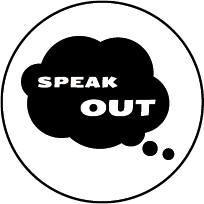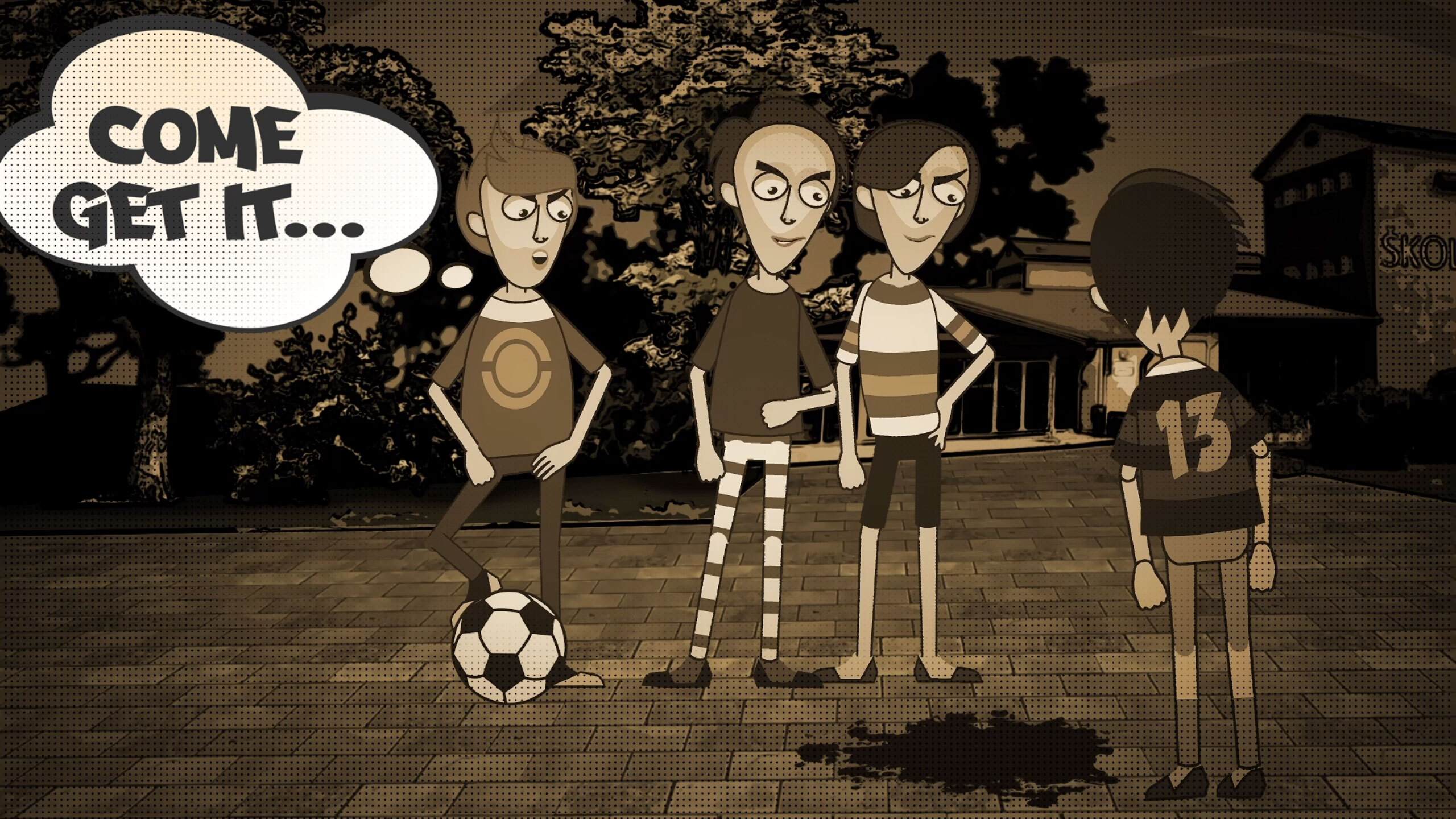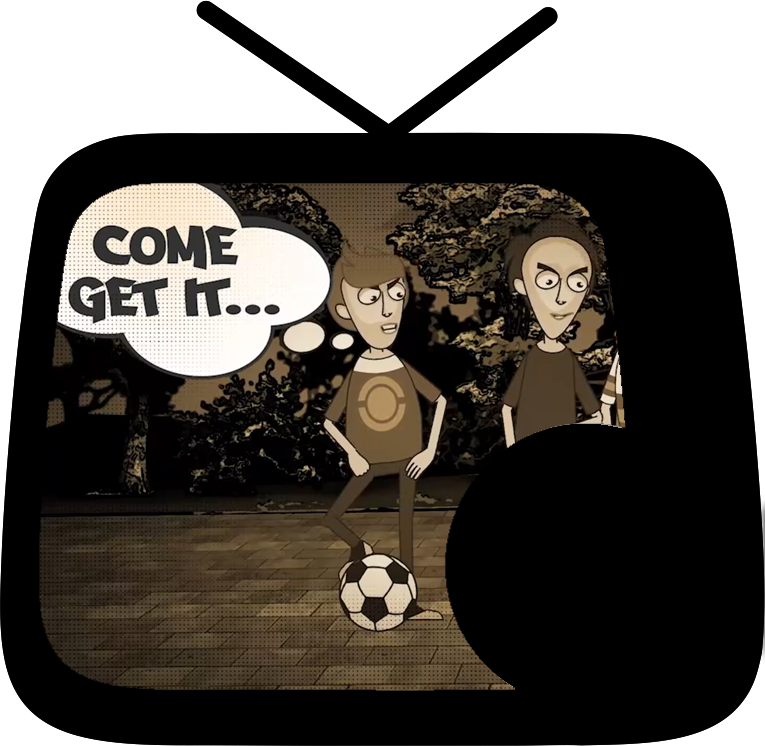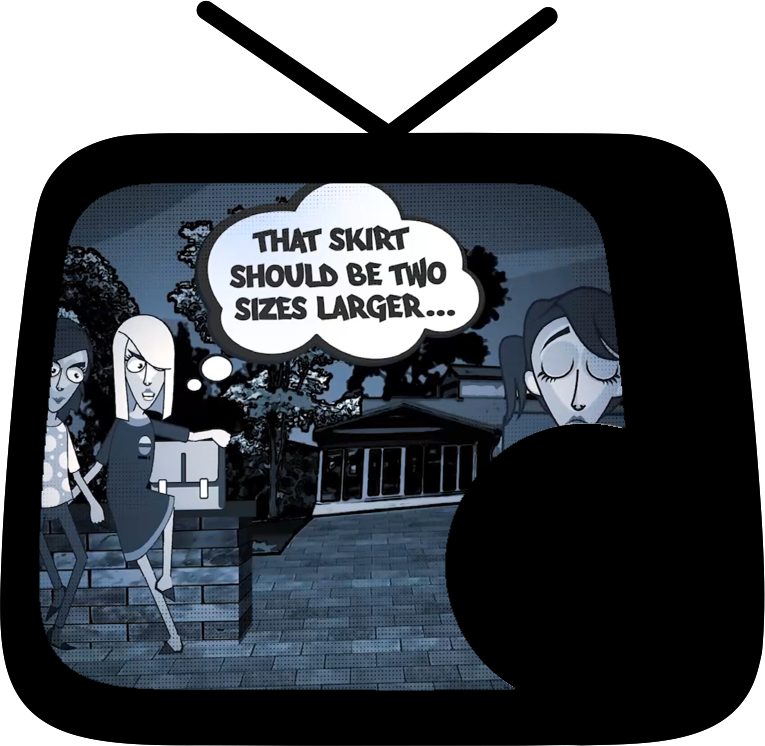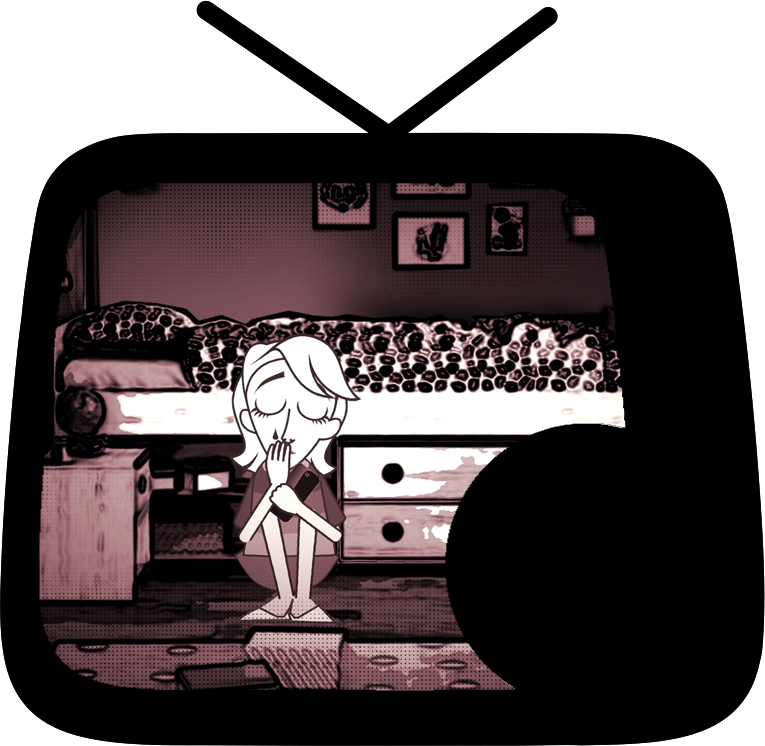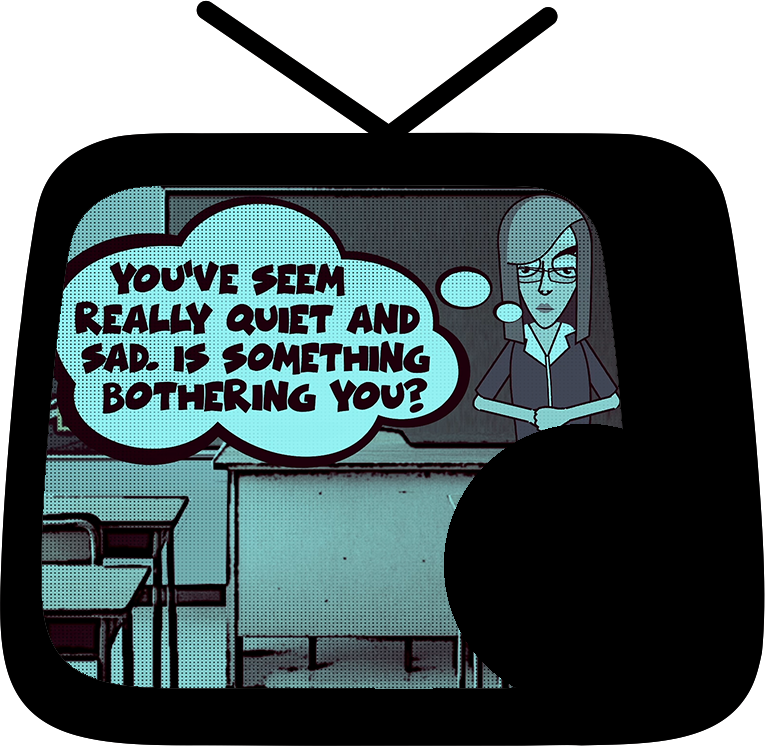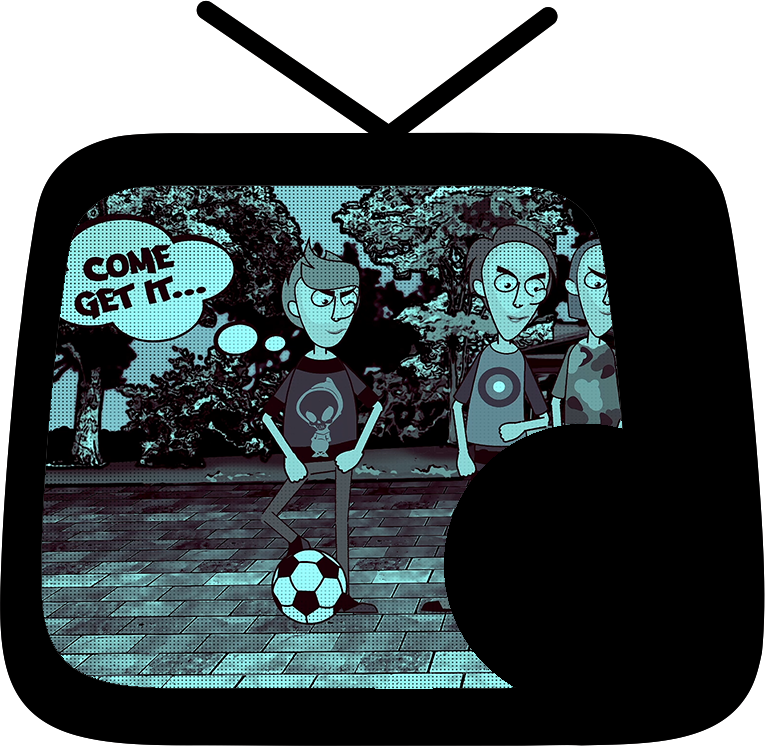speak out
If someone deliberately hurts you, attacks you verbally or physically, mocks you, humiliates you, excludes you from the company of others, forces you to do something you do not want to, or prevents you from doing something you would like or need to do... it is bullying!
A key characteristic of bullying is secrecy and inaccessibility. Often, all direct participants, for various reasons, try to prevent the bullying from being revealed.
Do not keep it to yourself! Do not try to solve it alone; do not be afraid to confide in someone!
YOU MUST SPEAK OUT
When you want to tease somebody, it must be fun for all people involved. If the other person is upset or sad, you apologize, and, above all, you do not continue! With bullying, it is the opposite. The bully aims to hurt and harm; their behavior is repeated and often escalates. When someone teases another person, the other can respond or stop it. If the person is unable to respond or defend themselves, it is not a silly joke; it is bullying! ...and you cannot deal with it on your own.
Do you experience this too?
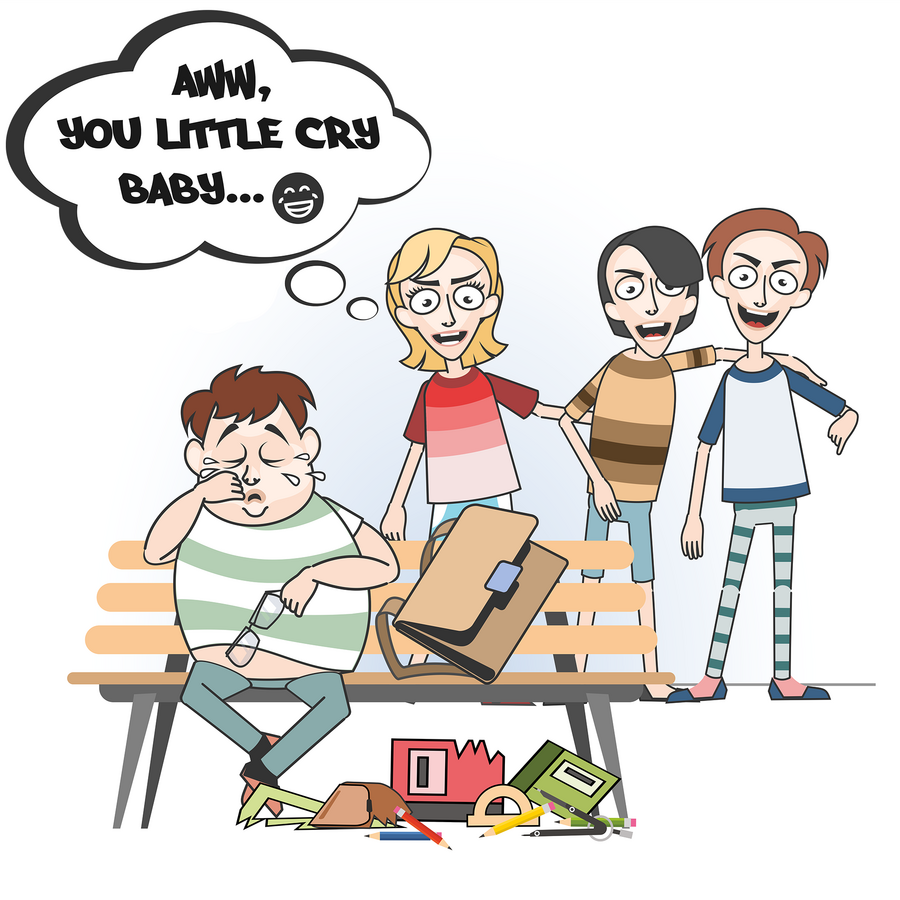
They
mock me, because
of how I look.
Verbal bullying means that you
- Are verbally teased (with inadequate words)
- Have your name called out and are ridiculed
- Receive inappropriate sexual or other comments
- Are mocked
- Are threatened
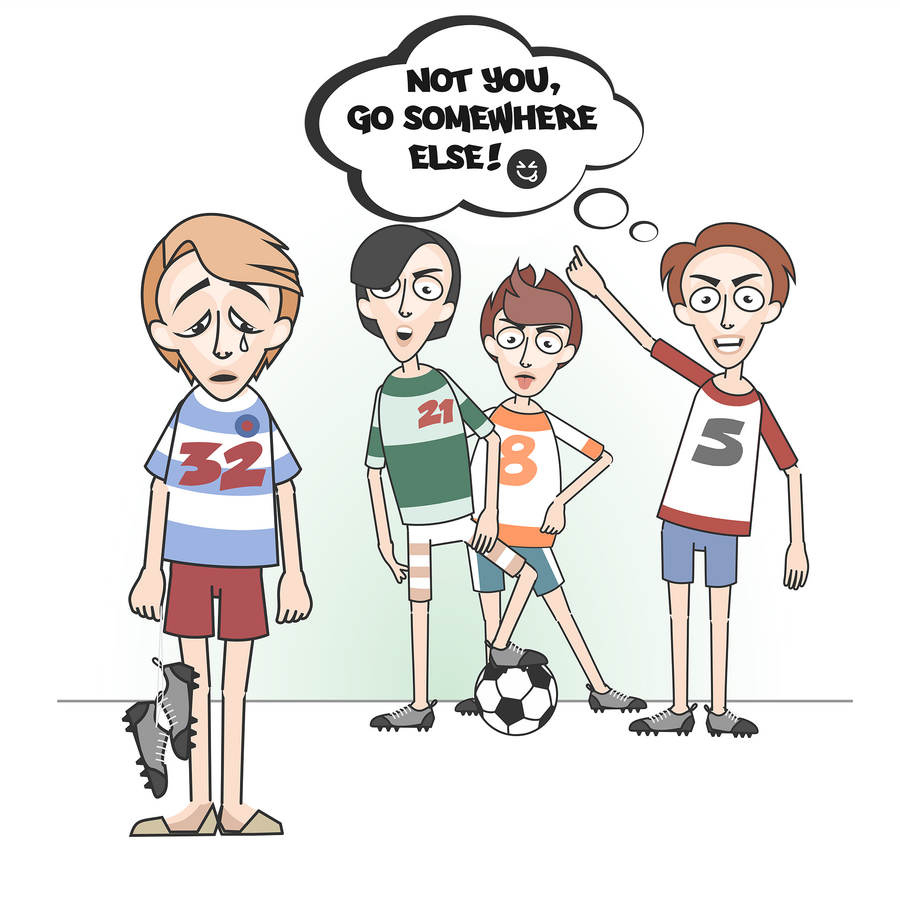
They exclude me,
they say I'm
weird.
Social bullying—also called relational bullying—is the damage to your reputation or relationships. Typical signs include:
- Intentionally excluding you from the group
- Telling other children not to be friends with you
- Spreading rumors and gossip about you
- Embarrassing you in public
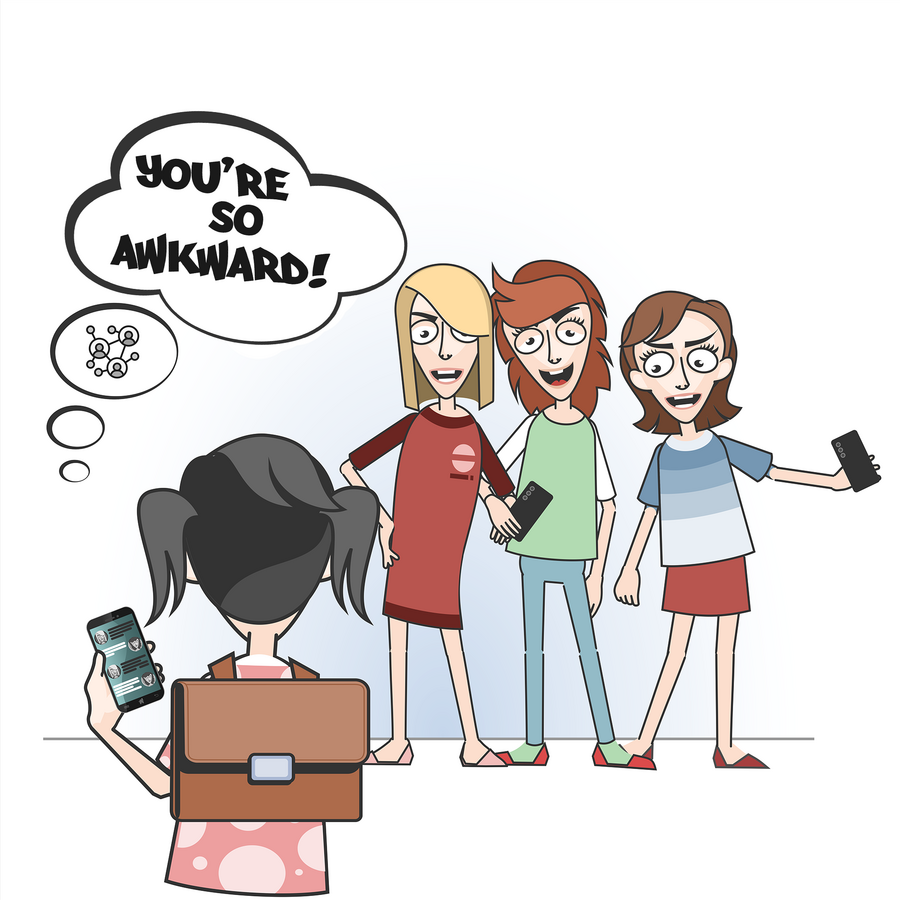
They make fun of my posts
Cyberbullying is a special type of bullying, a combination of social and verbal bullying.
- Occurs via social media or over the internet
- Others humiliate you through social media posts or comments and exclude you from conversations
- Others send hurtful comments and messages
It is highly dangerous because social platforms allow for cyberbullying to spread rapidly to wide communities.
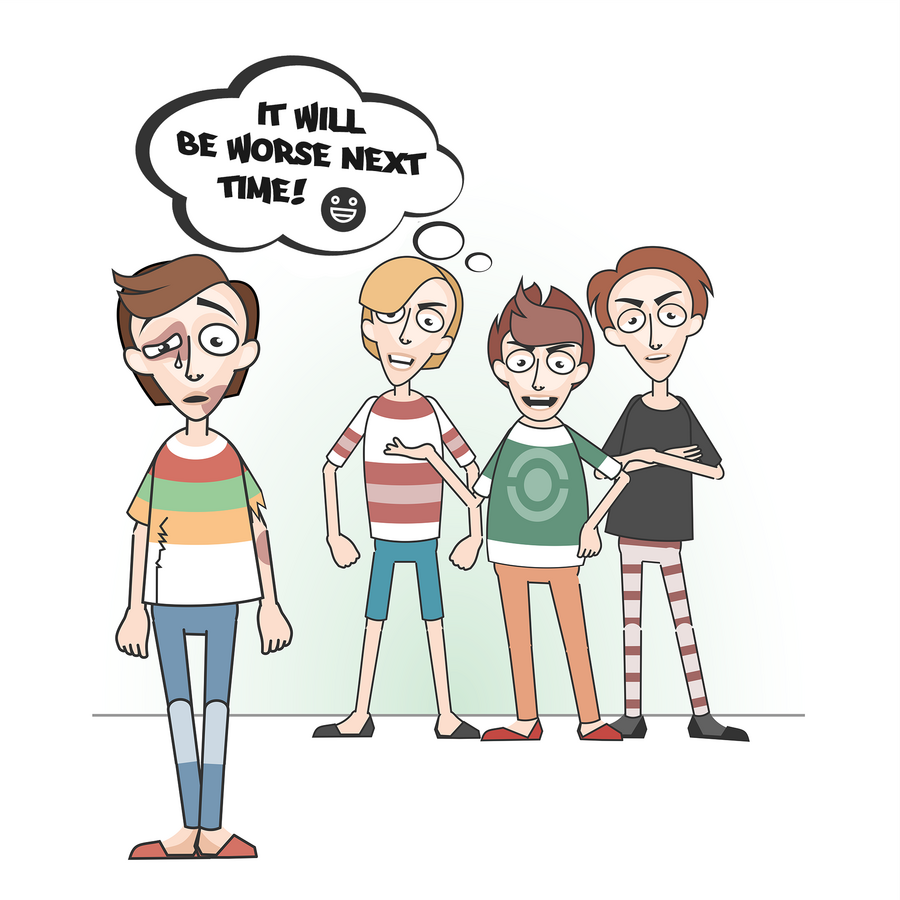
they were too many on me
Physical bullying involves harming you with force, injuring your body, or damaging your belongings.
- They hit you, kick you, pinch you
- They spit on you
- They push you, shove you, drag you
- They take your things
- They destroy your belongings
- They make rude or obscene gestures
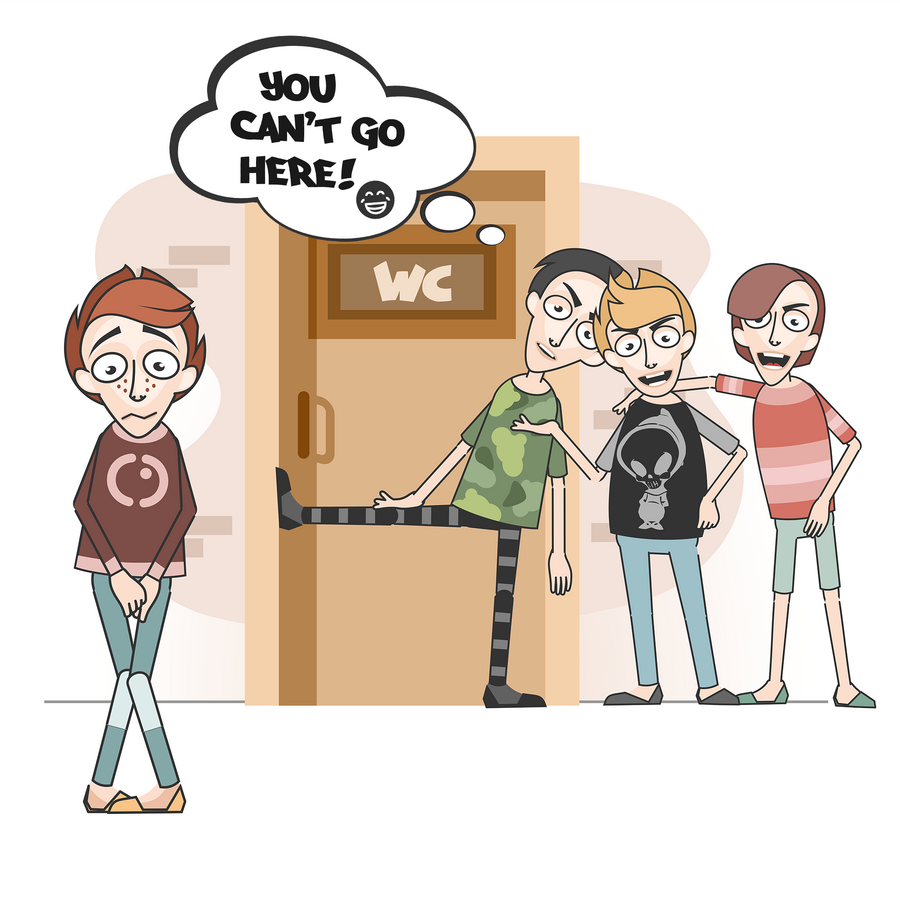
They forced me
Bullying also occurs when someone prevents you from doing something you need or want to do.
Bullying also happens when others force you to do something against your will.
- They force you with threats
- They don't allow you to do something; they block you
- They chase you against your will
- They prevent you from doing something you might want or need
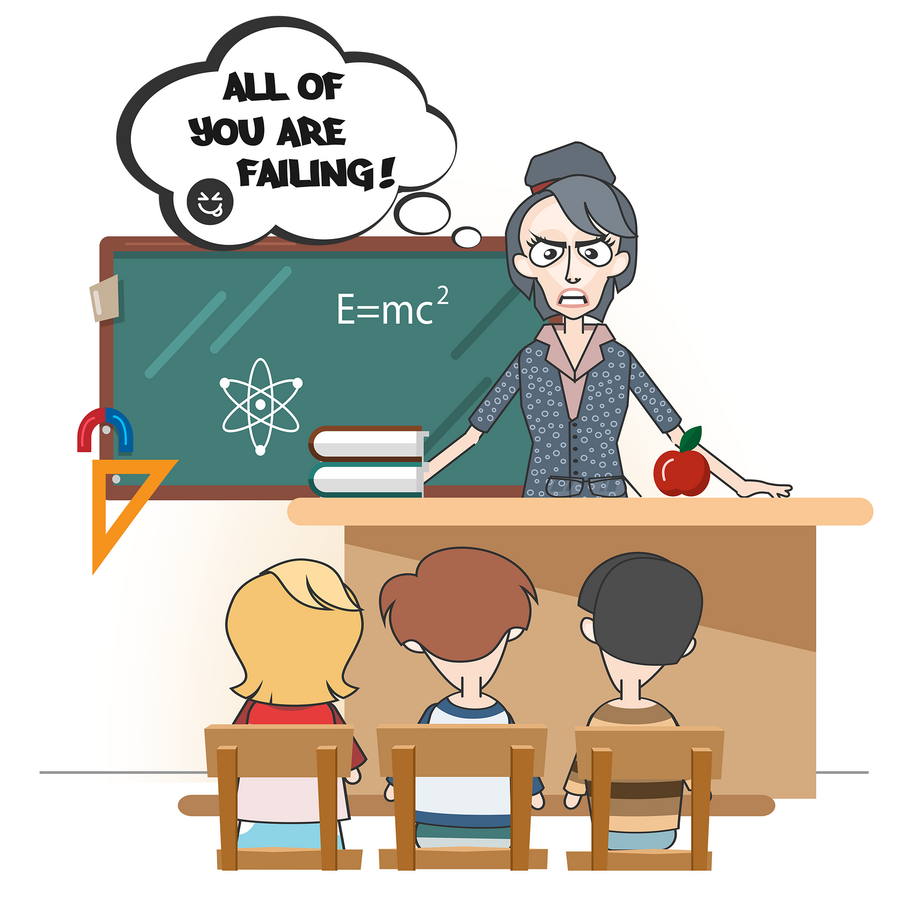
I got scared
Bullying doesn't only happen between children. It is very common for bullying to occur between adults and children, or even between adults themselves. This type often involves the abuse of authority and power, and its effects, especially in the presence of children, can be long-lasting.
- It could be a cruel or excessively strict teacher who targets students or attacks them verbally.
- It could be an aggressive superior at work.
- It could also involve bullying of elderly, vulnerable people who depend on the care of others.
- Unfortunately, bullying can even occur within families, often triggered by various misfortunes, stressful situations, unmanaged emotions, and, above all, imperfect character.
- You may fear the people who are supposed to care for you because they do not treat you well.
Good to know
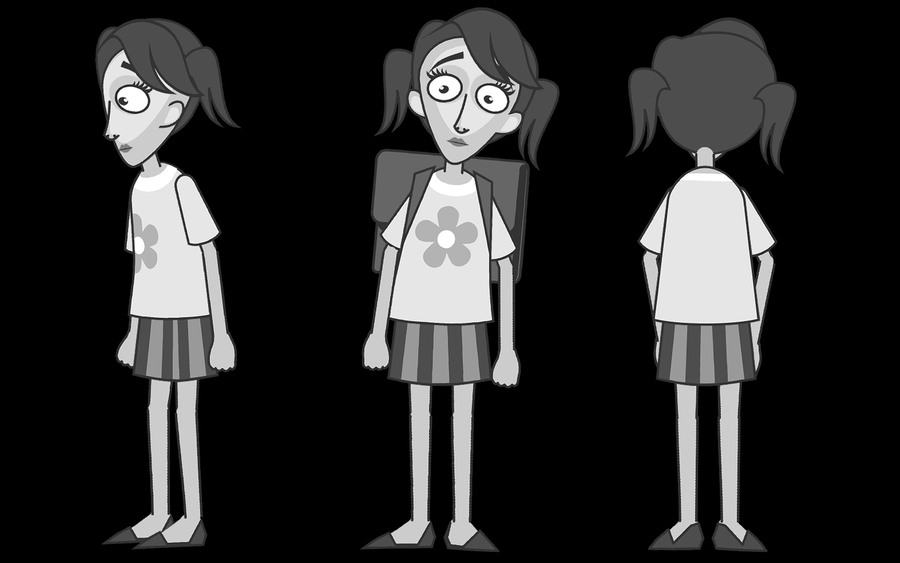
What is bullying?
Bullying is the harm done to an individual or a group. Such harm:
- Is targeted
- Is deliberate
- Is long-term
- Is repetitive
- Lowers the dignity of the individual
- Happens unilaterally (the victim does not retaliate openly)
- Occurs with the need to demonstrate power (a power imbalance exists)
- Occurs with the need for an audience
What are the different phases of bullying?
read more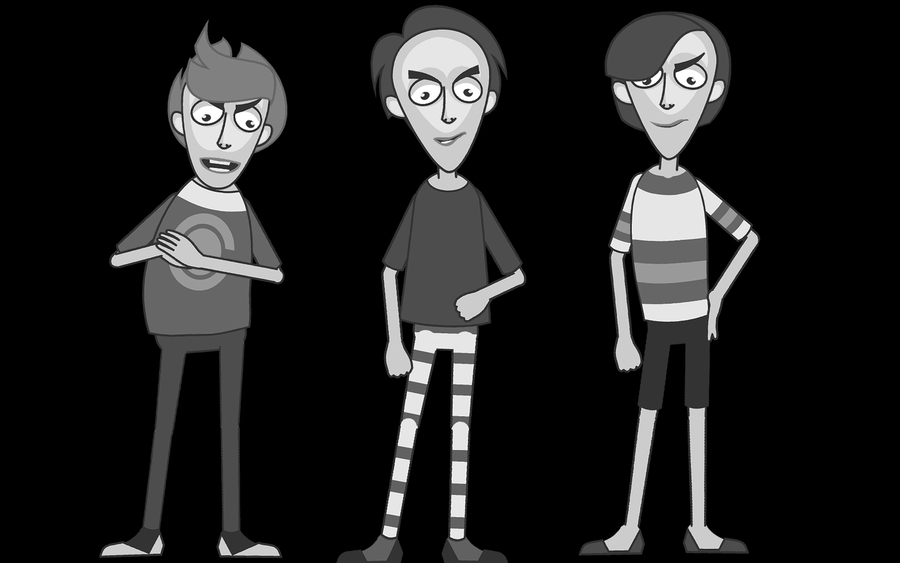
Who is the bully?
Who is the victim?
Children Who Bully:
These children engage in bullying behavior toward their peers. There are many risk factors that can contribute to a child becoming involved in such behavior. These students often require support to change their behavior and address any underlying issues that may be influencing their actions.
Children Who Are Bullied:
These children are the targets of bullying. Certain factors put children at a higher risk of being bullied, but not all children with these characteristics will necessarily experience bullying. These children need help learning how to respond to bullying and how to cope with the emotional and social challenges it creates.
read more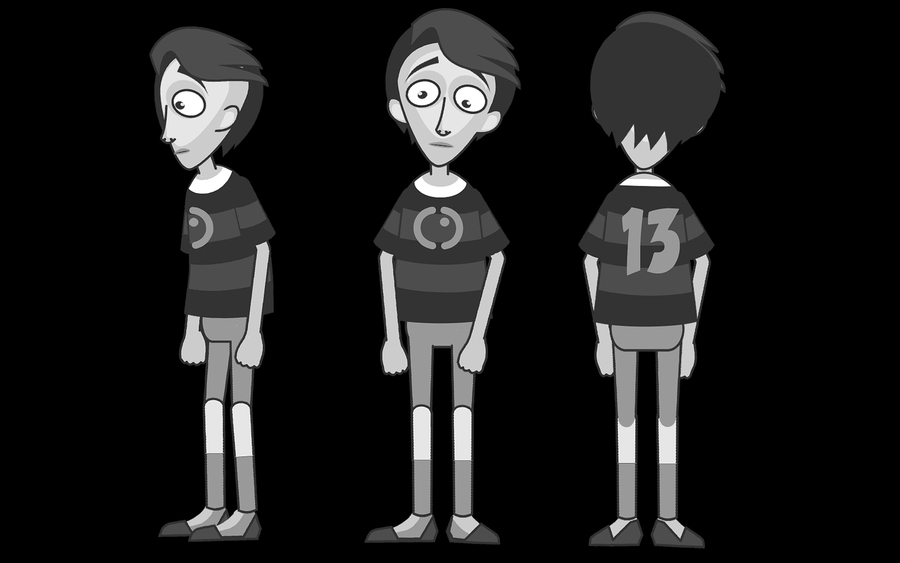
What can you do?
Speak out!
Why don't children ask for help?
Statistics from 2018 show that only 20% of school bullying cases were reported. Barriers to identifying and addressing bullying not only allow it to persist but also exacerbate its psychological consequences, which are undoubtedly severe and often long-lasting. Children often refrain from reporting bullying to adults for a variety of reasons.
What can you do about it?
- How to defend yourself at the beginning?
- How to behave when you don't know what to do?
- How to behave when you are a witness to such behavior?
- How to stop cyberbullying?
- What to do when I am a parent and my child confides in me about bullying?
Show the parents this website; here they have a procedure to follow!
read moreYou must speak out
but to whom?
mum?
dad?
your coach?
teacher?
simply somebody,
who you trust!
It is essential to confide in someone about bullying!
Are you a bullied child? You must confide in your parents, older siblings, a teacher, a school counselor, a coach—anyone you trust!
You cannot deal with bullying on your own. Don’t be afraid of any negative consequences.
Adults will make sure the bullying stops and the bully is confronted.
If you cannot confide in an adult around you, it is crucial to contact specialized helplines.
such as:
- Bullying Minimization Counseling: http://www.minimalizacesikany.cz/poradna, tel. 116 000, available 24/7
- Crisis Intervention Center helpline: +420 284 016 666, available 24/7
- Children's Crisis Center helpline: +420 241 484 149, available 24/7
- Prague helpline (Pražská linka důvěry):
- Phone: +420 222 580 697 (available 24/7)
- Chat: chat-pomoc.cz
- Operating hours:
- Monday to Thursday: 9:00 AM – 9:00 PM
- Friday: 9:00 AM – 3:00 PM
- Saturday: 2:00 PM – 8:00 PM
- Sunday: Closed
- Email: linka.duvery@csspraha.cz
- Website: csspraha.cz/prazska-linka-duvery
- Safety line (Linka bezpečí):
- Phone: 116 111 (available 24/7)
- Chat: chat.linkabezpeci.cz
- Operating hours:
- Daily: 9:00 AM – 1:00 PM and 3:00 PM – 7:00 PM
- Email: pomoc@linkabezpeci.cz
- Website: linkabezpeci.cz
-
Confidential Helpline, tel. 222 580 697, available 24/7
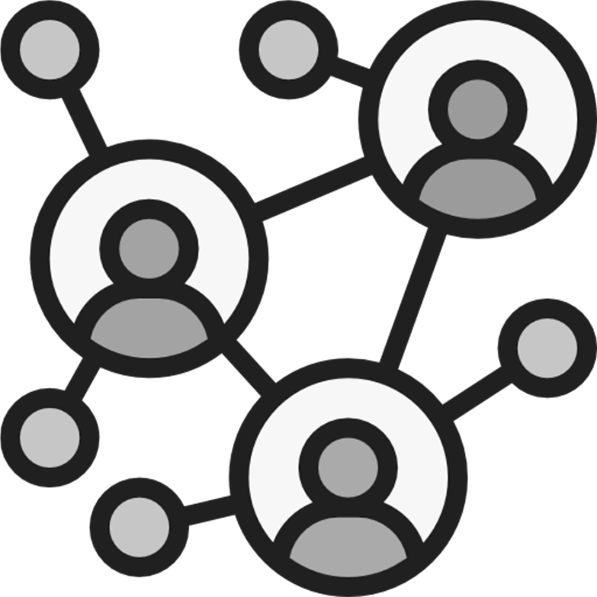
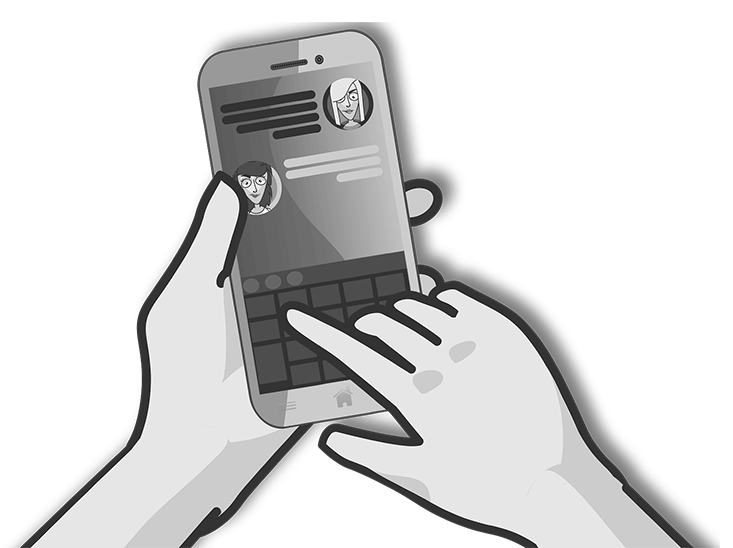
Real-life stories
"Look at yourself, ugh!"
"Not even plastic surgery could help you."
"Did you see what she's wearing again? What a nightmare!"
"Do you hear that? They're badmouthing you again..."
I used to hear this almost daily in middle school. In eighth grade, on a class photo, one of my classmates even burned out my face, saying that I would ruin the picture. Many breaks I spent trembling and crying in the bathroom. Yeah, I was probably a bit different, unusual, maybe weird. I didn't (and still don't) have perfect skin or teeth. I didn’t wear the latest fashionable clothes—how could I, when my mom had to deal with things like figuring out how to feed us because my dad had once again gambled away his paycheck at the slot machines? Middle school was one of the most toxic environments I’ve ever had to navigate, and I believe I wasn’t the only one who felt that way.
There were definitely moments when I joined in on someone else, just to divert attention away from myself and have a brief moment of peace. For many of us who were "affected in the same way," this was the only defense that worked. I regret it deeply. But I don’t blame others for doing the same—everyone was just trying to find their place, and everyone had their own struggles.
In the lower grades of elementary school, Šárka Tomečková had good relationships with her classmates. However, everything changed when she moved to the upper grades. She began facing insults and ridicule from her peers, primarily because of her appearance. “I didn’t look like my classmates; I definitely wasn’t as physically developed as they were,” says Šárka, now a high school student, who decided to share her experiences in her book Svačinka (Snack).
She endured verbal bullying throughout the entire upper grade period. During the school year, there were phases when she was targeted by her classmates and phases when they simply ignored her. She felt like she didn’t belong among them. Toward the end of elementary school, the attacks from her classmates became more frequent, which took a toll on her mental health. She became afraid to go to school and withdrew into herself. “I blamed myself and kept thinking that the bullying was my own fault,” she explains, describing her feelings.
Five years ago, the city of Liberec was shaken by the suicide of 13-year-old Julie M. The cause was prolonged bullying by her classmates at an elementary school—one that is considered "elite."
This tragedy led to the launch of a two-year project called Princess Julie, which was introduced to journalists yesterday by Liberec Deputy Mayor Ivan Langr. The initiative aims to implement a comprehensive set of measures through which the city, in collaboration with schools and the municipal police, hopes to prevent similar tragedies in the future. “We want bullying in schools to be addressed at its early stages with a stronger impact on the perpetrators because it simply cannot be tolerated,” Langr stated.
“Children often do not realize that their actions may constitute a criminal offense,” added Daniela Bušková, spokesperson for the Liberec municipal police, which will be involved in the project.
"We had no idea what was happening until one day, a terrified teacher ran up to me, asking if I could come with her immediately. She handed me my son, who was lying on the boys' bathroom floor, completely beaten, unable to stand or return to class," a mother recounts anonymously for the podcast Bullying on Rádio Junior.
The bullying then moved outside the school building, she continues. "After our son was ambushed and beaten several times on his way to extracurricular activities, we, along with his grandparents, started taking turns escorting him to and from school," she explains.
The ordeal lasted for several years—beginning when her son entered middle school and continuing until eighth grade.
Her story highlights not only the extreme lengths to which bullying can escalate but also the school's inadequate response. The administration organized an open meeting between the victim and the aggressor, with other classmates present.
However, such an approach rarely leads to genuine remorse from the perpetrator.
"Forcing them to shake hands and declare that everything will be fine forever doesn't solve anything. Those responsible need to understand that they crossed a line—and you can't force that realization on them," says Renata Vordová, a school psychologist and trainer for the Bullying Prevention project.
The First Meeting
As soon as our homeroom teacher walked through the door, she immediately made an unfriendly impression on me. She scanned the entire class with her eyes and then motioned for me to move to the first row. I didn’t understand why and was really upset, so I told her I didn’t want to sit there and didn’t see any reason to move. “If you don’t want to get a note on the very first day of school, then move and don’t argue,” she responded sternly. I had no choice but to gather my things and angrily sit where she pointed. I could feel myself turning red, and a wave of heat rushed over me. The whole class was in complete silence, everyone was on edge. I don’t know what I did to deserve this behavior, but from that moment on, our homeroom teacher, who also taught us German and, as fate would have it, two other subjects, continuously bullied me.
It is easy to become a victim of bullying on the internet. Often, the perpetrator pretends to be someone else and exploits the situation. This is how a lonely boy started receiving messages on social media from a girl. Over time, they exchanged intimate photos. In reality, there was no girl—just classmates who were making fun of him and exploiting his trust. When the boy discovered the truth, he wanted to commit suicide. For his classmates, it was a joke; for him, it was a reason to die.
